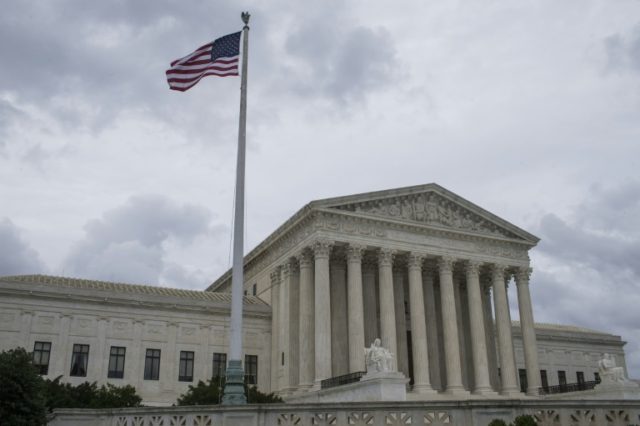Los Angeles (AFP) – Justice Anthony Kennedy’s retirement from the United States Supreme Court has sparked fears over universal abortion rights as President Donald Trump looks for an ultra-conservative replacement judge.
Before Trump’s election, the court was finely balanced at four Republican appointees against four Democratic picks, with one seat vacant, and the then-candidate pledged to nominate only anti-abortion justices.
Abortion is largely a state-level issue in the US, although the legal right to access nationwide was enshrined in the landmark 1973 decision known as “Roe vs Wade.”
“There is a very high risk that Roe vs Wade would be seriously excoriated by the soon-to-be nominated United States Supreme Court justice,” women’s rights lawyer Gloria Allred told AFP.
Kennedy, a Ronald Reagan appointee, was considered a moderating voice on a variety of contentious issues, including abortion, and the Center for Reproductive Rights has described his departure as “devastating.”
Left-wing Senator Elizabeth Warren sees the appointment of Kennedy’s replacement as “the fight of our lives,” while the anti-abortion movement is already claiming its own victory.
“If the next justice appointed supports the basic human right to life for ALL people, this could be the end of the horrific, immoral and unjust 1973 Roe vs Wade decision,” said activist Lila Rose.
The Pew Research Center says 57 percent of Americans support the right to abortion, while evangelicals, Mormons and other religious groups make up most of the 40 percent who are against.
The religious right argues that since Trump’s anti-abortion stance was plain for all to see during the 2016 campaign, he and Vice President Mike Pence, who describes himself as a “born-again, evangelical Catholic,” have their popular mandate.
– Bible Belt fundamentalism –
Women’s rights activists worry that the political wind is turning against them after a string of conservative judgments by the Supreme Court.
Just two days ago, in a 5-4 ruling, justices reversed a lower court decision upholding a California law that requires anti-abortion crisis pregnancy centers to more fully disclose what they are and make clear that they do not perform abortions.
The state enacted a law in 2015 to ensure that these centers do not mislead their patients, intentionally or otherwise, when giving advice about abortion and the alternatives.
Across America’s red states, examples of Christian pharmacists being permitted by law to refuse to give out contraceptives or morning after pills are legion.
Meanwhile, the Supreme Court recently ruled in favor of a Colorado baker who refused to make a cake to celebrate the marriage of a same-sex couple because of a religious objection.
Local laws restricting access to abortion have tightened in recent years in the so-called Bible Belt — the southern and midwestern states where conservative Protestant fervor thrives.
In parts of America such as Arizona, patients have to drive for hours to get to a handful of clinics in the big cities, entailing travel and childcare costs that many young women cannot afford.
Two years ago, Kennedy was the deciding vote in overturning a Texas law requiring abortion clinics to undergo stringent and expensive upgrades — from surgical equipment to parking availability and staffing — to bring them up to the standards of a hospital room.
– ‘Abortion deserts’ –
Activists say the improvements were unnecessary, and would have achieved their real goal of curtailing abortion through the forced closure of around three-quarters of clinics.
“There are already abortion deserts… with very few providers,” said Jennifer Dalven, of the American Civil Liberties Union.
“The Supreme Court justices don’t need to overturn Roe vs Wade. They could stop short of that and (still) make it unavailable to millions of women.”
Allison Hoffman, a law professor at the University of Pennsylvania, says many Supreme Court decisions that fell short of a full repeal of Row vs Wade have nevertheless eroded women’s rights.
“If repealed, women would not be guaranteed access to abortion, so any state that wanted to pass laws that restrict or outlaw abortion could do so,” she said.
“You can imagine which states would restrict and which wouldn’t.”
Supreme Court nominees need to be backed by a simple majority of the 100-strong Senate.
The current breakdown is 51 Republicans to 49 Democrats but with Arizona Republican John McCain out sick, that brings it down to 50-49, meaning the GOP can’t afford to lose a single vote.
Given the high stakes involved in picking a new Supreme Court justice — these appointments can last decades — both sides are mobilizing, but the pro-choice campaign isn’t optimistic.
“The Democrats will put up a fight but, after the smoke clears, I think an anti-Roe vs Wade justice will be appointed,” Allred concluded.
“Courts will go back to the 1950s where abortion was criminalized in many states… We’ll be seeing a turn back of the clock because the Trump nominee will likely be someone who is going to be anti-choice maybe anti-civil rights.”

COMMENTS
Please let us know if you're having issues with commenting.